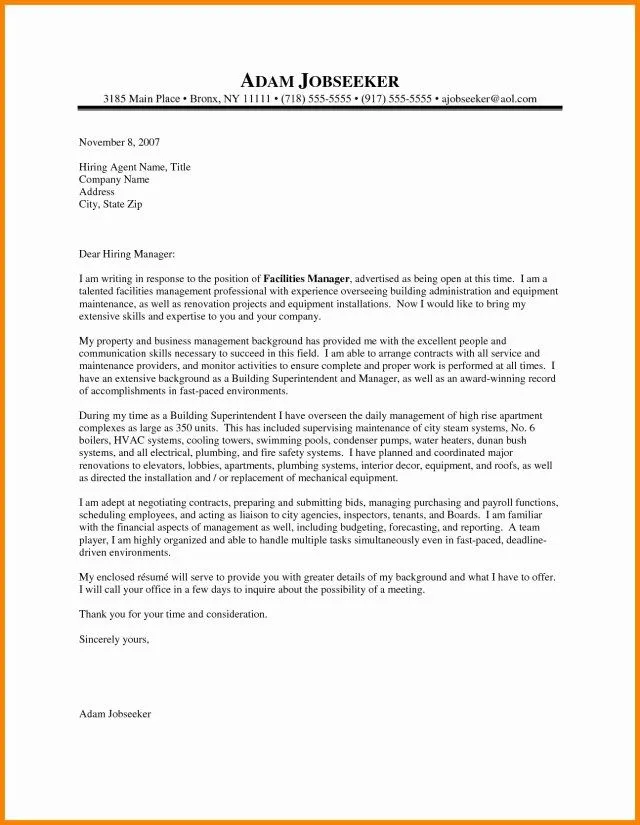Why a Recruiter Cover Letter Matters
In the competitive world of recruitment, a well-crafted cover letter can be your golden ticket to landing your dream job. It’s more than just a formality; it’s your first impression, a chance to showcase your personality, skills, and enthusiasm before the hiring manager even looks at your resume. A compelling cover letter can make you stand out from a stack of applicants, demonstrating that you’ve taken the time to understand the role and the company. It also gives you an opportunity to explain gaps in your employment history, elaborate on your achievements, and highlight why you’re the perfect fit for the position. Ignoring the cover letter is like leaving money on the table; it’s a missed opportunity to make a powerful first impression and secure your interview.
What to Include in Your Recruiter Cover Letter
A recruiter cover letter should be a concise yet comprehensive overview of your qualifications and aspirations. It’s a carefully curated narrative that bridges the gap between your resume and the job description, emphasizing your suitability for the role. Start with your contact information and the date, followed by the hiring manager’s details if available. The opening paragraph should immediately grab the reader’s attention, clearly stating the position you’re applying for and expressing your interest. The body of the letter should then highlight your relevant experience, quantify your achievements, and showcase your skills. Tailor your letter to the job description, and always express your enthusiasm for the opportunity. Finally, proofread meticulously before sending the letter to ensure it is error-free and professional. This structure provides a clear roadmap for composing a compelling cover letter that resonates with recruiters.
Your Contact Information and Date
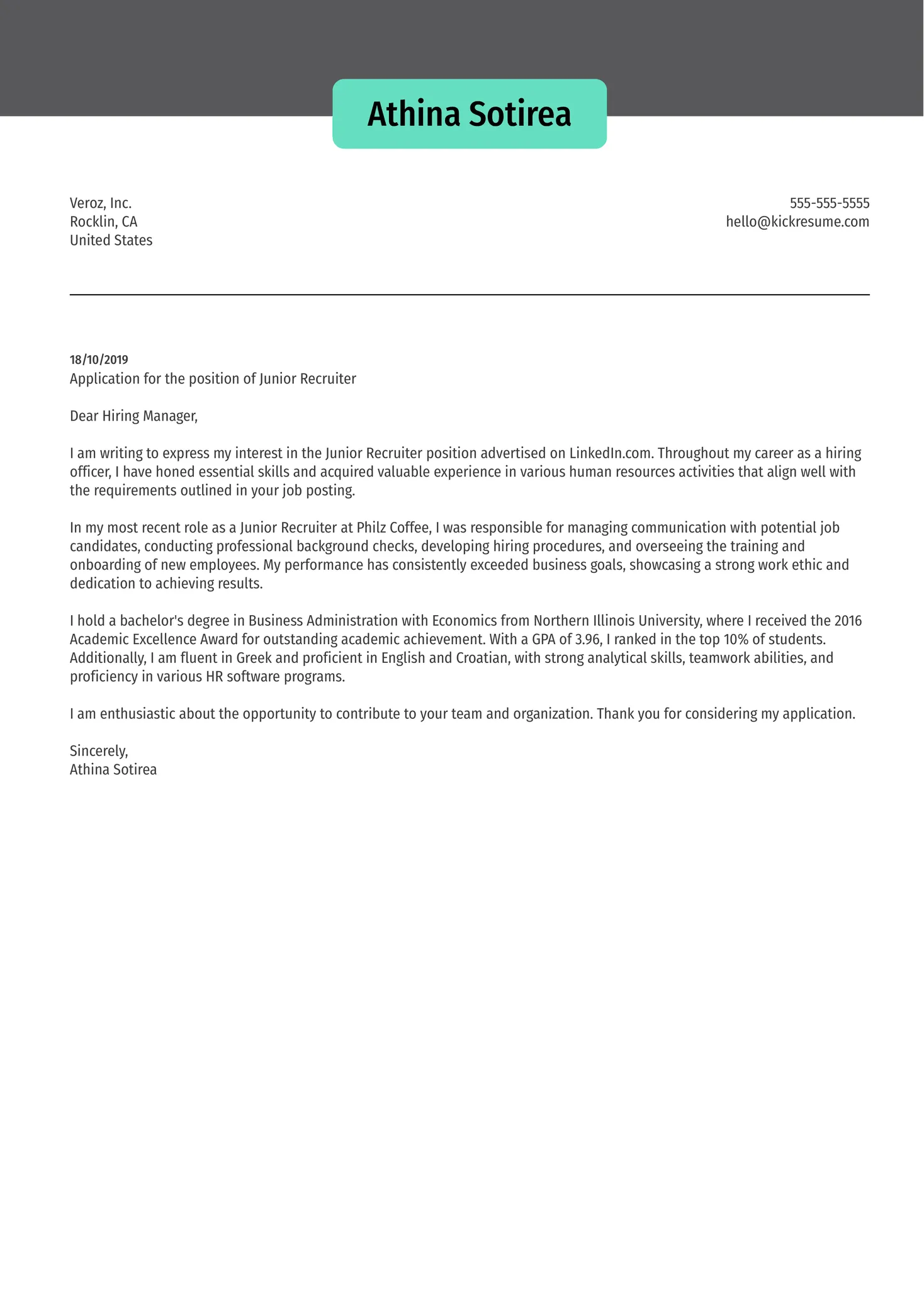
At the very top of your cover letter, you should include your contact information, making it easy for the recruiter to get in touch with you. This typically includes your full name, phone number, professional email address, and optionally, your LinkedIn profile URL. Ensure that your email address is professional; avoid using nicknames or informal language. Following your contact information, place the date of the letter. This provides context and helps the recruiter keep track of when you applied. Correct formatting and attention to detail in this section shows professionalism and helps streamline the application process, providing all the necessary information in a clear and accessible manner.
The Hiring Manager’s Information
Whenever possible, address your cover letter to a specific person, such as the hiring manager or the recruiter listed in the job posting. Researching the hiring manager’s name and title demonstrates your initiative and attention to detail. If you can’t find a specific name, use a professional greeting like ‘Dear Hiring Manager’ or ‘Dear [Company Name] Recruitment Team’. Including the hiring manager’s information shows that you’ve put in the effort to personalize your application, rather than sending out a generic letter. This personalization can make a significant impact, demonstrating your commitment to the role and increasing your chances of standing out in the application process.
A Compelling Opening Paragraph
Your opening paragraph is your first chance to make a positive impression, so it should be engaging and attention-grabbing. Start by clearly stating the position you are applying for and where you found the job listing. Briefly express your interest in the role and the company, highlighting what specifically attracted you to the opportunity. If you have a relevant connection or referral, mention it here. The opening paragraph should set the tone for the rest of the letter, showcasing your enthusiasm and making the reader want to learn more about your qualifications. A strong start can significantly increase the likelihood of the hiring manager continuing to read your cover letter.
Highlight Your Relevant Experience
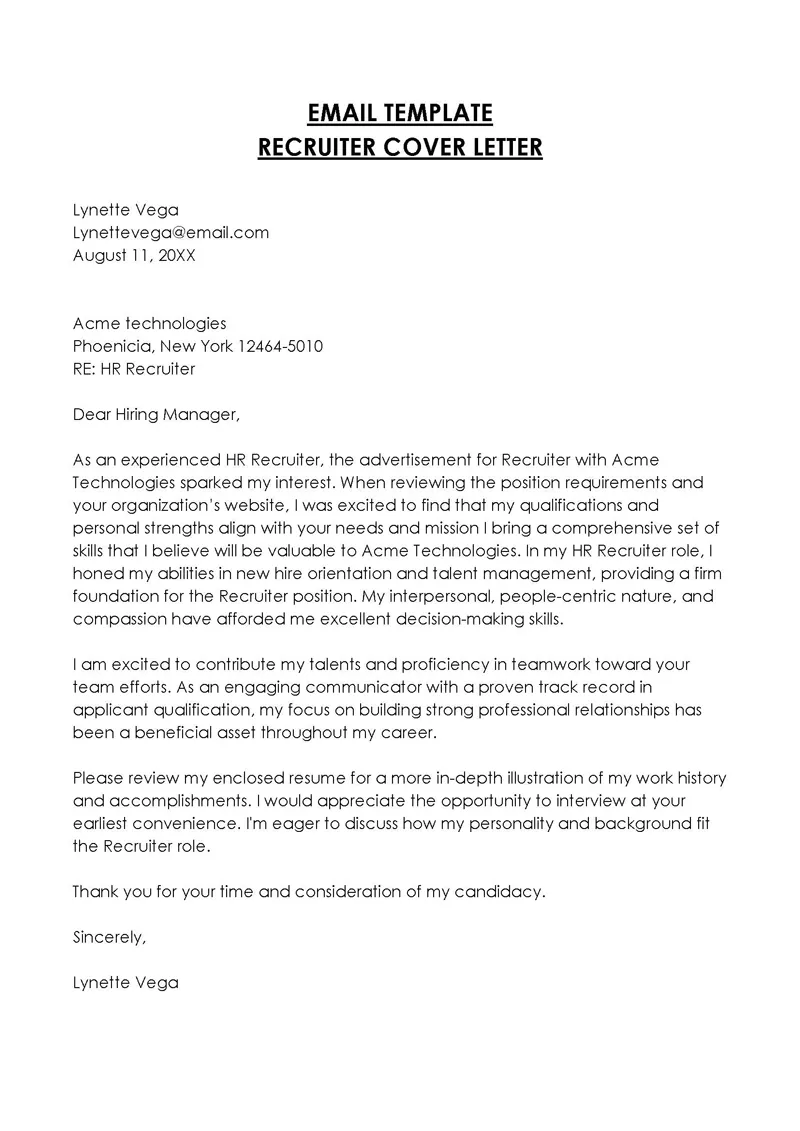
The body of your cover letter is where you elaborate on your professional experience, focusing on aspects that align with the job requirements. Select the most relevant experiences from your work history, detailing your responsibilities and the skills you used. Mention specific projects or tasks that showcase your abilities, such as sourcing candidates, conducting interviews, or managing the recruitment process. Use action verbs to describe your accomplishments and achievements, emphasizing what you have done and the results you have delivered. Tailor the content to the specific requirements listed in the job description, highlighting the experiences that directly demonstrate your ability to excel in the role. This targeted approach ensures your cover letter resonates with the hiring manager and positions you as a strong candidate.
Quantify Your Achievements
To make your cover letter more impactful, quantify your achievements whenever possible. Instead of simply stating that you improved the recruitment process, mention by how much, for example, “reduced time-to-hire by 20%.” Provide specific data points to demonstrate your impact, such as the number of candidates sourced, the percentage of successful hires, or the cost savings you generated. Quantifiable results provide concrete evidence of your abilities and demonstrate your value to the company. Use numbers, percentages, and other measurable data to make your claims more compelling and credible, making your achievements stand out to the hiring manager.
Showcase Your Skills
Beyond your work experience, your cover letter should showcase your skills, both hard and soft, that align with the job requirements. Mention relevant technical skills, such as your proficiency with applicant tracking systems (ATS), social media platforms, or other recruitment tools. Highlight soft skills such as communication, problem-solving, leadership, and teamwork. Provide specific examples of how you have used these skills in previous roles. By clearly showcasing your skills, you give the hiring manager a comprehensive understanding of your capabilities and how you can contribute to their team. This combination of hard and soft skills is critical in demonstrating that you are a well-rounded candidate who can meet the demands of the recruiter position.
Tailor to the Job Description
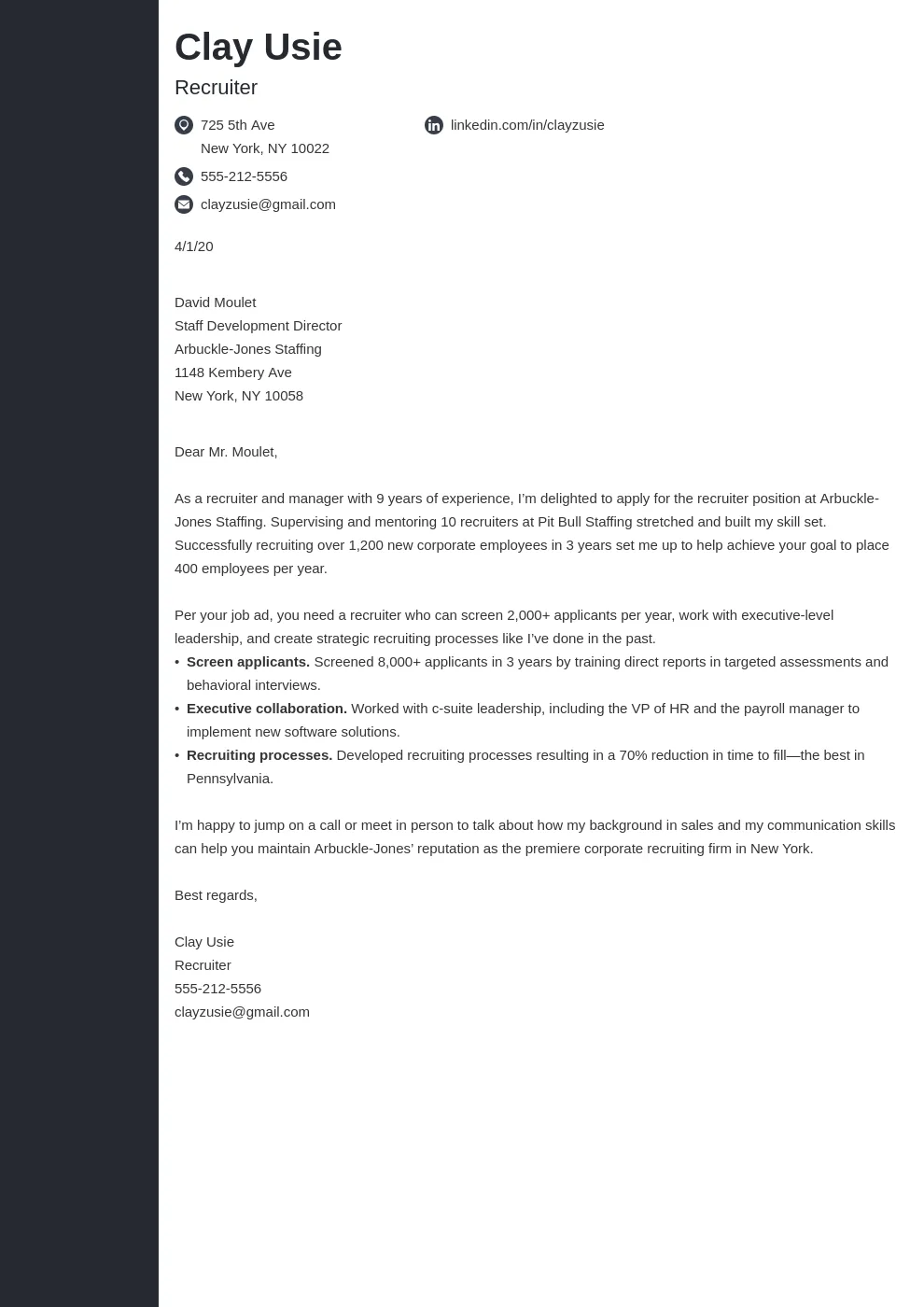
Avoid using a generic cover letter for every job application. Instead, tailor each letter to the specific requirements of the job description. Carefully review the job posting and identify the key skills, experiences, and qualifications that the employer is seeking. Then, customize your cover letter to address these specific points, highlighting how your experience and skills align with their needs. Show how your accomplishments and experiences match what the company is looking for. This tailored approach demonstrates that you’ve taken the time to understand the role and the company, and that you’re genuinely interested in the opportunity. By customizing your cover letter, you significantly increase your chances of grabbing the hiring manager’s attention and securing an interview.
Express Your Enthusiasm
Let your enthusiasm for the position and the company shine through in your cover letter. Express your genuine interest in the role and explain why you’re excited about the opportunity. Share what you admire about the company and why you want to be a part of their team. Expressing your enthusiasm can make you a more memorable candidate. Showing your passion demonstrates your motivation and commitment, making you stand out from other applicants. Enthusiasm reflects positively on your professional demeanor and your potential contributions to the team.
Proofread Carefully Before Sending
Before submitting your cover letter, meticulously proofread it for any errors in grammar, spelling, and punctuation. Typos and grammatical mistakes can undermine your professionalism and credibility. Read the letter multiple times, and consider using a grammar checker tool to identify potential issues. Ask a friend or colleague to review your cover letter as well, as a fresh pair of eyes can often catch errors you may have missed. Ensure your cover letter is error-free to demonstrate your attention to detail and professionalism, leaving a positive impression on the hiring manager.
A Strong Closing Paragraph
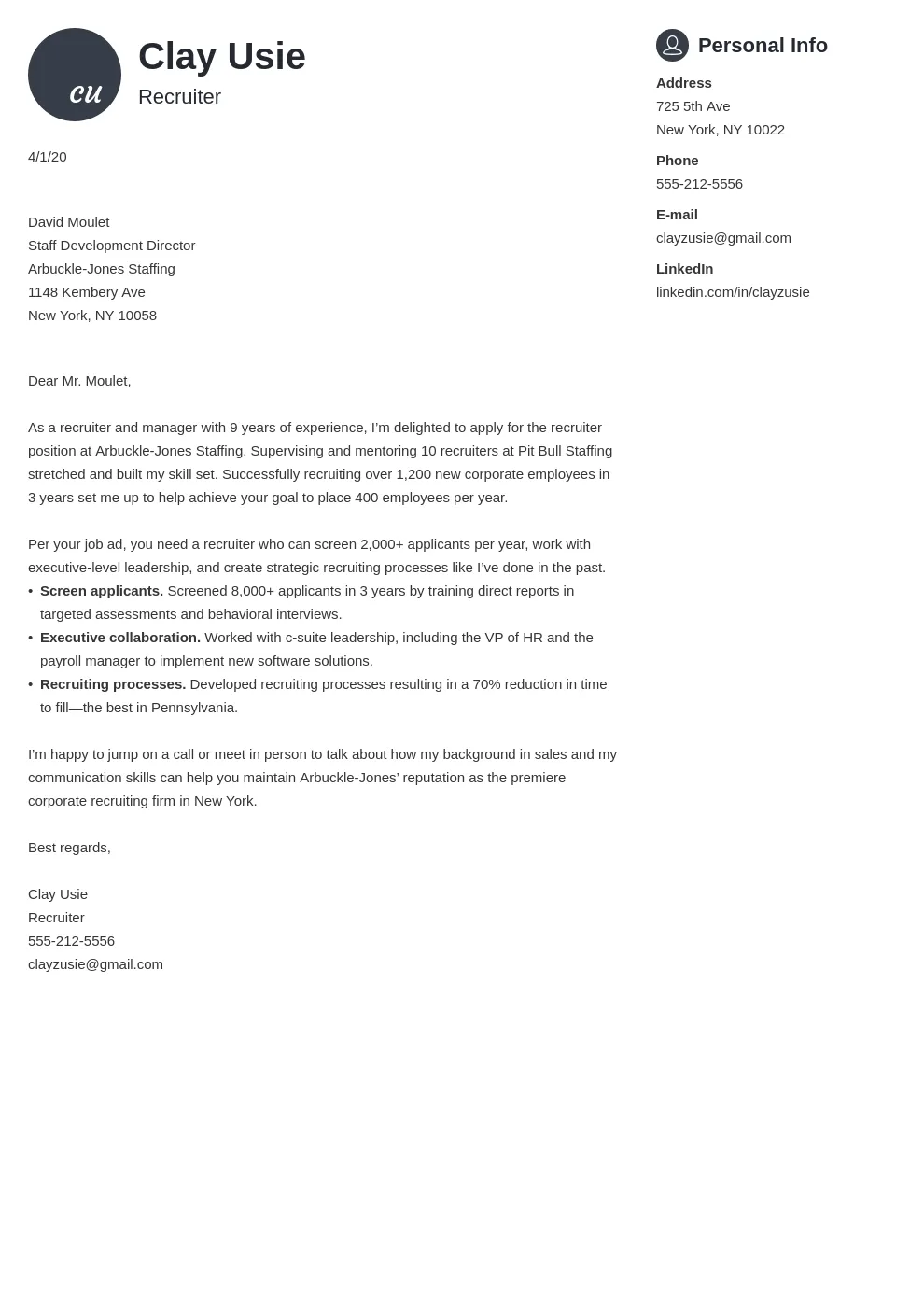
Conclude your cover letter with a strong closing paragraph that reiterates your interest in the position and expresses your eagerness to hear back from the recruiter. Thank the hiring manager for their time and consideration. Include a clear call to action, such as stating that you look forward to discussing your qualifications further in an interview. Ensure your closing is professional and leaves a positive lasting impression, reinforcing why you are a suitable candidate for the recruiter position. End on a confident note, expressing your enthusiasm and the value you believe you can bring to the role.
